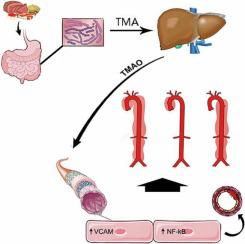当前位置:
X-MOL 学术
›
J. Mol. Cell. Cardiol.
›
论文详情
Our official English website, www.x-mol.net, welcomes your feedback! (Note: you will need to create a separate account there.)
Gut microbial metabolite trimethylamine N-oxide induces aortic dissection
Journal of Molecular and Cellular Cardiology ( IF 5 ) Pub Date : 2024-02-21 , DOI: 10.1016/j.yjmcc.2024.02.007 Shan Huang , Shijuan Gao , Yihui Shao , Ping Li , Jie Lu , Ke Xu , Zeyi Zhou , Yulin Li , Jie Du
Journal of Molecular and Cellular Cardiology ( IF 5 ) Pub Date : 2024-02-21 , DOI: 10.1016/j.yjmcc.2024.02.007 Shan Huang , Shijuan Gao , Yihui Shao , Ping Li , Jie Lu , Ke Xu , Zeyi Zhou , Yulin Li , Jie Du

|
Aortic dissection (AD) is the most catastrophic vascular disease with a high mortality rate. Trimethylamine N-oxide (TMAO), a gut microbial metabolite, has been implicated in the pathogenesis of cardiovascular diseases. However, the role of TMAO in AD and the underlying mechanisms remain unclear. This study aimed to explore the effects of TMAO on AD. Plasma and fecal samples from patients with AD and healthy individuals were collected to analyze TMAO levels and gut microbial species, respectively. The plasma levels of TMAO were significantly higher in 253 AD patients compared with those in 98 healthy subjects (3.47, interquartile range (IQR): 2.33 to 5.18 μM 1.85, IQR: 1.40 to 3.35 μM; < 0.001). High plasma TMAO levels were positively associated with AD severity. An increase in the relative abundance of TMA-producing genera in patients with AD was revealed using 16S rRNA sequencing. In the angiotensin II or β-aminopropionitrile-induced rodent model of AD, mice fed a TMAO-supplemented diet were more likely to develop AD compared to mice fed a normal diet. Conversely, TMAO depletion mitigated AD formation in the BAPN model. RNA sequencing of aortic endothelial cells isolated from mice administered TMAO revealed significant upregulation of genes involved in inflammatory pathways. The experiments verified that TMAO promotes endothelial dysfunction and activates nuclear factor (NF)-κB signaling. The BAPN-induced AD model confirmed that TMAO increased aortic inflammation. Our study demonstrates that the gut microbial metabolite TMAO aggravates the development of AD at least in part by inducing endothelial dysfunction and inflammation. This study provides new insights into the etiology of AD and ideas for its management.
中文翻译:

肠道微生物代谢物三甲胺 N-氧化物诱导主动脉夹层
主动脉夹层(AD)是最具灾难性的血管疾病,死亡率很高。三甲胺 N-氧化物 (TMAO) 是一种肠道微生物代谢产物,与心血管疾病的发病机制有关。然而,TMAO 在 AD 中的作用及其潜在机制仍不清楚。本研究旨在探讨TMAO对AD的影响。收集 AD 患者和健康个体的血浆和粪便样本,分别分析 TMAO 水平和肠道微生物种类。与98名健康受试者相比,253名AD患者的血浆TMAO水平显着升高(3.47,四分位距(IQR):2.33至5.18μM 1.85,IQR:1.40至3.35μM;<0.001)。高血浆 TMAO 水平与 AD 严重程度呈正相关。 16S rRNA 测序显示,AD 患者中产生 TMA 的属相对丰度有所增加。在血管紧张素 II 或 β-氨基丙腈诱导的 AD 啮齿动物模型中,与喂养正常饮食的小鼠相比,饲喂添加 TMAO 饮食的小鼠更容易患 AD。相反,TMAO 消耗减轻了 BAPN 模型中 AD 的形成。对从施用 TMAO 的小鼠中分离出的主动脉内皮细胞进行 RNA 测序显示,炎症途径中涉及的基因显着上调。实验证实TMAO可促进内皮功能障碍并激活核因子(NF)-κB信号传导。 BAPN 诱导的 AD 模型证实 TMAO 会增加主动脉炎症。我们的研究表明,肠道微生物代谢物 TMAO 至少部分通过诱导内皮功能障碍和炎症来加重 AD 的发展。这项研究为AD的病因学和治疗思路提供了新的见解。
更新日期:2024-02-21
中文翻译:

肠道微生物代谢物三甲胺 N-氧化物诱导主动脉夹层
主动脉夹层(AD)是最具灾难性的血管疾病,死亡率很高。三甲胺 N-氧化物 (TMAO) 是一种肠道微生物代谢产物,与心血管疾病的发病机制有关。然而,TMAO 在 AD 中的作用及其潜在机制仍不清楚。本研究旨在探讨TMAO对AD的影响。收集 AD 患者和健康个体的血浆和粪便样本,分别分析 TMAO 水平和肠道微生物种类。与98名健康受试者相比,253名AD患者的血浆TMAO水平显着升高(3.47,四分位距(IQR):2.33至5.18μM 1.85,IQR:1.40至3.35μM;<0.001)。高血浆 TMAO 水平与 AD 严重程度呈正相关。 16S rRNA 测序显示,AD 患者中产生 TMA 的属相对丰度有所增加。在血管紧张素 II 或 β-氨基丙腈诱导的 AD 啮齿动物模型中,与喂养正常饮食的小鼠相比,饲喂添加 TMAO 饮食的小鼠更容易患 AD。相反,TMAO 消耗减轻了 BAPN 模型中 AD 的形成。对从施用 TMAO 的小鼠中分离出的主动脉内皮细胞进行 RNA 测序显示,炎症途径中涉及的基因显着上调。实验证实TMAO可促进内皮功能障碍并激活核因子(NF)-κB信号传导。 BAPN 诱导的 AD 模型证实 TMAO 会增加主动脉炎症。我们的研究表明,肠道微生物代谢物 TMAO 至少部分通过诱导内皮功能障碍和炎症来加重 AD 的发展。这项研究为AD的病因学和治疗思路提供了新的见解。



























 京公网安备 11010802027423号
京公网安备 11010802027423号